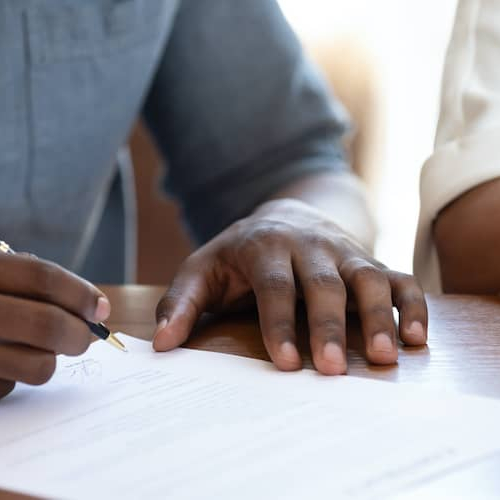Promissory notes: What are they?
Contributed by Sarah Henseler
Dec 15, 2025
•6-minute read

You may have heard of the term “promissory note” while navigating the home buying process, but what is a promissory note, exactly?
Put simply, a promissory note is a legally binding document that confirms the borrower’s obligation to repay a loan. (See, they’re easier to understand than they sound!)
We’ll dive deeper into promissory notes in this article to enhance your understanding of the promissory note meaning in real estate, including walking through their types, what they contain, and why they’re important during your home buying journey.
What is a promissory note?
Think of a promissory note as an IOU. Put more formally, it’s a written agreement between a borrower and a lender defined under § 3-104 of the Uniform Commercial Code (UCC) to ensure a borrower repays a loan. Lenders can include home sellers, banks, credit unions, and mortgage lenders. In real estate, a promissory note specifically outlines the borrower’s obligation to repay their mortgage by the maturity date to a named holder of the note.
Promissory notes contain the principal amount (amount borrowed), interest rate, repayment schedule, late payment and default provisions, and collateral, which a lender can seize if the borrower defaults.
A brief history of promissory notes
Promissory notes are written promises to repay debt and have been around for hundreds of years. Promissory notes were originally believed to have been created in ancient China, then showed up in European history before becoming a part of the modern world. Money made of precious metal in ancient times made it difficult to transport, so the promissory note came into being. In the U.S., promissory notes became central to banking and real estate finance, especially in mortgage notes.
Today, promissory notes can exist digitally as electronic promissory notes (eNotes), showing their evolution from paper to modern financial instruments. eNotes contain the same key terms you’d find on a paper promissory note, but because it’s electronically generated, it can’t be physically signed and doesn’t need to be printed, stored, or shipped. They’re a more secure, reliable alternative, offering more efficiency than the original promissory notes on paper.
What is the meaning of promissory notes in real estate?
Promissory notes are part of the legal and financial process of buying a home. At closing, both a mortgage and a mortgage promissory note are executed, serving complementary purposes. The mortgage or eMortgage secures the promissory note with the property title as collateral in case of default.
The lender keeps the original note until the loan is paid off, while the borrower receives a copy. An electronic version, or eNote, functions the same way when closing online.
Why do mortgage lenders use promissory notes?
Lenders use promissory notes to ensure due process if a borrower doesn’t repay; in other words, it’s a way to enforce the loan agreement. The note holds borrowers to their repayment promise and gives mortgage lenders the right to foreclose if necessary.
Most homeowners will not encounter their promissory notes if they make payments regularly and on time – in other words, continue to repay your mortgage and your lender won’t use your promissory note to enforce the loan agreement.
Mortgage note vs. promissory note
What’s the difference between a promissory note and a mortgage note? All mortgage notes are promissory notes, but not all promissory notes are mortgage notes. If that sounds confusing, remember that a mortgage note is a specific type of promissory note, and there are other promissory notes for different items.
A mortgage note includes specific mortgage terms, like principal, down payment, interest type, and prepayment penalties.
When should you use a promissory note?
You can use a promissory note whenever anyone loans money between individuals, companies, or banks. Small loans between friends or family may not require a promissory note, but it’s still a good idea to have some sort of agreement to ensure the money lent out gets repaid.
Without a promissory note, a lender has limited recourse to enforce repayment. A promissory note is generally a good idea to ensure the loan is repaid, even if some small loans skip the promissory note altogether.
Essential elements of a promissory note
Let’s take a closer look at the main elements of a promissory note, including party identification, monetary values, repayment terms, and signatures and execution.
Identification of parties
- Borrower’s name and contact information
- Lender details and contact information
Monetary values
- Total amount of money to be borrowed
- Interest rate being charged and how it has been calculated
- Additional fees and charges, if applicable
Repayment terms
- Date of first required payment
- Required payment amount
- Number of required payments
- Frequency of regular payments
- Repayment terms and options
- Loan maturity date
- Loan conditions
- Collateral involved (in the case of a mortgage, the property is the collateral)
- Possible explanations of mortgage default and consequences (these are not always included)
- Waivers, if applicable
Signatures and execution
- Date and location of note issuance
- Signatures of both parties (this is what makes it legally binding)
Types of promissory notes
There are three main types of promissory notes: secured, unsecured, and the aptly titled master promissory note (MPN). Here’s a quick overview of each:
- Secured promissory notes: Secured promissory notes require collateral, such as a home or property, to secure a loan and ensure repayment. Mortgage notes are a type of secured promissory note because they use your home as collateral to secure the loan.
- Unsecured promissory notes: Unsecured promissory notes do not require collateral, but the borrower must still repay the loan. Lenders can sue or use debt collectors if a borrower misses payments with an unsecured promissory note.
- Master promissory notes (MPN): Master promissory notes are for multiple loans under one agreement, such as federal student loans; in real estate, each new or refinanced home loan requires a separate promissory note.
What happens if you don’t adhere to the terms of a promissory note?
A promissory note is a legally binding document, which means that any mortgage that is not paid allows the lender to pursue legal action. Late fees, penalties, and correspondence from your loan servicer will also kick in.
First, borrowers typically receive a demand letter, which says you owe a certain amount by a certain date. Continually not paying may involve a collections lawyer and potential court action over time. For secured loans like mortgages, not paying on your mortgage can lead to foreclosure. After 30 days, your mortgage servicer will file a notice of default with your local government and report it to the credit bureaus, which could also affect your credit score in a negative way.
Some loans, such as Federal Housing Administration (FHA) mortgages, provide extra borrower protections during legal proceedings. Check with your lender for more information on additional protections that FHA loans can offer and the exact foreclosure process in your state.
However, it’s important to remember that the bank wants to help you – to work out solutions to help you keep your home and avoid foreclosure.
FAQ about promissory notes
It’s important to understand promissory notes in full, so if you still have questions, continue reading our list of FAQ below for more information.
Can you write your own promissory note?
Yes, you can write your own promissory note, but using a template or (preferably) a real estate attorney can ensure it’s legally correct. A well-written promissory note ensures clear loan terms, smooths risks, and facilitates clear financial transactions to protect your rights and interests.
Can you get a promissory note without a mortgage?
Yes, a promissory note can be used without a mortgage, such as in a seller-financed take-back mortgage, which occurs when the owner of real estate finances the sale instead of a bank or outside party doing so. A real estate lawyer can mitigate any potential risks by taking a look at promissory notes in full. However, in most cases, mortgages come with promissory notes.
What happens after you pay off a promissory note?
Your mortgage lender should send you a payoff statement, canceled promissory note, property deed, and certificate of satisfaction or deed of reconveyance. Some lenders will return your original promissory note marked “paid in full.” Your lender will also report the payoff to credit agencies once the note is considered fully paid.
The bottom line: Understand promissory notes to protect your assets
You typically can’t have a mortgage without a promissory note, so it’s important to recognize the promissory note as a critical part of a mortgage – it legally binds you as a borrower to repay the loan. However, learning about and understanding promissory notes doesn’t have to be a scary situation; the key is to continue to make on-time payments throughout the life of your loan. If you keep up with your loan payments, your promissory note never needs to affect your assets.
Check with your lender for more information about what your promissory note will entail when buying a house.
Ready to buy a home? Start your mortgage application online to begin the homeownership process.

Melissa Brock
Melissa Brock is a freelance writer and editor who writes about higher education, trading, investing, personal finance, cryptocurrency, mortgages and insurance. Melissa also writes SEO-driven blog copy for independent educational consultants and runs her website, College Money Tips, to help families navigate the college journey. She spent 12 years in the admission office at her alma mater.
Related resources
12-minute read
When will mortgage rates go down?
Mortgage rates tend to fluctuate, but certain indicators can signal they’re going to drop. Learn when experts predict home interest rates to go down.
Read more

6-minute read
What does collateral mean and how does it work?
Collateral is an asset used to secure a loan. If a borrower defaults, the lender can take the collateral to recover losses.
Read more
6-minute read
How a Fed rate drop affects home buyers and sellers
What’s the impact on home buyers and sellers when the federal funds rate drops? Learn how a Fed rate drop impacts interest rates and home loans.
Read more